Local SEO has emerged as a critical strategy for businesses, and law firms are no exception. With potential clients increasingly relying on search engines to find legal services in their vicinity, mastering local SEO is paramount for lawyers aiming to expand their digital presence. This comprehensive guide will delve into the intricacies of local SEO tailored specifically for the legal industry.
Look at Some Key Takeaways
Local SEO, or local search engine optimization, involves optimizing a business’s online presence to attract local customers. For lawyers, this means ensuring that potential clients in their geographic area can easily find them through online searches.
Local SEO for lawyers is the process of optimizing a law firm’s online presence to attract clients in their specific geographical area. This involves various strategies, from optimizing Google My Business profiles to incorporating local keywords into website content.
Purpose of the Guide
This guide aims to equip lawyers with the knowledge and tools needed to implement effective local SEO strategies. By understanding and implementing these techniques, law firms can increase their visibility in local searches, attract more clients, and stay ahead in an increasingly competitive digital landscape.
Local Search Impact For Law firm
Understanding the impact of local search is crucial for lawyers. When potential clients search for legal services, search engines aim to provide results relevant to their location, making local SEO a key factor in online visibility.
Take a Look Most Key Factors of Local SEO For Lawyers
Google My Business (GMB) Optimization
- Setting up and claiming your GMB profile is the first step in local SEO.
- Optimizing business information, including accurate location details and business hours.
- Selecting relevant categories to ensure accurate classification.
- Adding high-quality images to enhance your profile.
- Encouraging clients to leave reviews on your GMB profile.
Local Keyword Research For Law Firm
-
- Identify relevant local keywords for lawyers, considering specific legal services and location.
- Utilize tools like Google Keyword Planner for comprehensive keyword research.
- Integrate selected keywords naturally into website content.
- Create localized landing pages to target specific geographic areas.
Online Reviews and Testimonials
-
-
- Recognize the importance of online reviews for local SEO.
- Develop strategies to encourage clients to leave positive reviews.
- Respond to reviews promptly and professionally.
- Showcase testimonials on your website to build trust with potential clients.
-
NAP (Name, Address, Phone Number) Consistency
-
- Ensure accurate and consistent business information across online directories.
- Regularly update information to reflect any changes.
- Understand the impact of NAP consistency on local search ranking.
Local Link Building Strategies
-
-
- Build high-quality local citations by ensuring consistent business information.
- Obtain local backlinks from authoritative local sources, such as legal directories.
- Participate in local community events and sponsorships to build local connections.
- Leverage partnerships with local businesses for link building opportunities.
-
How to Optimize Google My Business (GMB) Optimization For Law Firms?
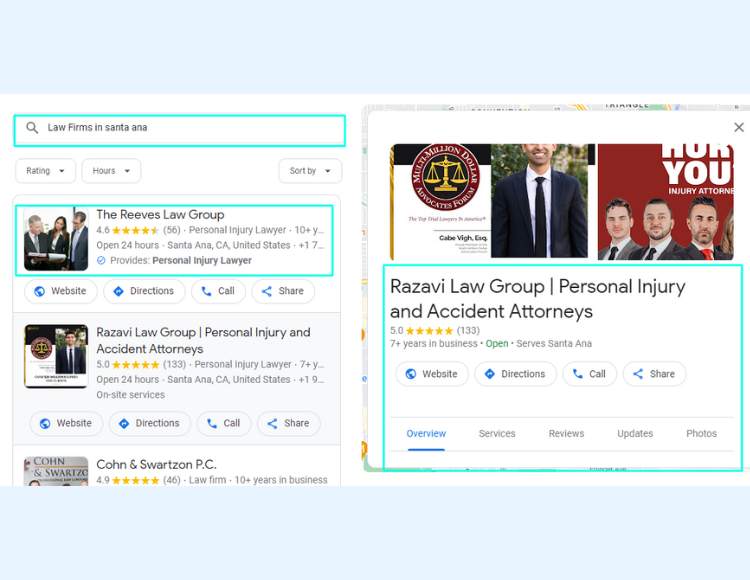
Optimizing your Google My Business (GMB) profile is crucial for law firms looking to enhance their online visibility and attract local clients. Follow these steps to ensure your GMB profile is fully optimized.
-
Setting Up and Claiming Your GMB Profile
Google My Business is a powerful tool for local SEO. Start by claiming and verifying your GMB profile if you haven’t already. This involves a simple verification process that may include receiving a postcard at your business address.
-
Optimizing Business Information
Ensure that your GMB profile is complete and accurate. Provide your law firm’s name, address, phone number, website, business hours, and a concise business description. This information should mirror the details on your website and other online platforms.
-
Selecting Relevant Categories
Choose the most appropriate categories for your legal services. Google uses these categories to understand your business and match it with relevant search queries. Be specific in selecting categories that accurately represent the legal services you offer.
-
Adding High-Quality Images
Visual content is crucial for engaging potential clients. Add high-quality images of your law firm, attorneys, and the office space. This not only enhances your profile but also provides a glimpse into your firm’s professionalism and environment.
-
Encouraging Client Reviews on GMB
Positive reviews on your GMB profile can significantly impact your local search ranking. Encourage satisfied clients to leave reviews by providing exceptional service and making the review process simple. Respond to reviews, whether positive or negative, to show that your firm values client feedback.
Local Keyword Research For Law Firms
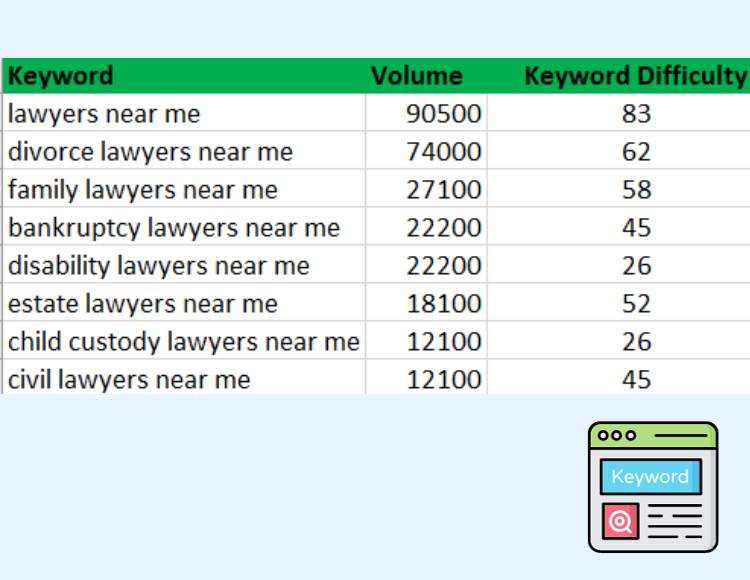
Local keyword research for lawyers is a crucial aspect of optimizing your online presence to attract clients in your specific geographic area. Here’s a step-by-step guide to help you conduct effective local keyword research:
- Identifying Relevant Local Keywords for Lawyers
Start by understanding the specific legal services you offer and the locations you serve. Identify keywords that potential clients are likely to use when searching for legal assistance in your area.
- Tools and Techniques for Local Keyword Research
Utilize tools like Google Keyword Planner, SEMrush, or Ahrefs to discover relevant keywords. Focus on long-tail keywords that reflect the unique legal services you provide. Consider the search intent behind each keyword to tailor your content accordingly.
- Incorporating Keywords into Website Content
Once you have identified relevant keywords, integrate them naturally into your website content. This includes your homepage, practice area pages, and blog posts. Avoid keyword stuffing, and prioritize providing valuable and informative content.
- Creating Localized Landing Pages
Develop localized landing pages for specific geographic areas you serve. These pages should include information about the legal services you offer in that area, client testimonials, and relevant local keywords. This helps target a wider range of local search queries.
Online Reviews and Testimonials
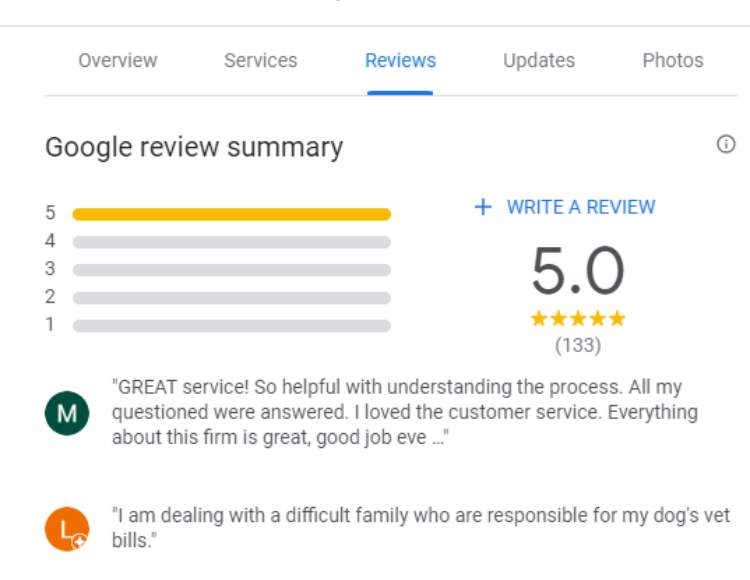
Online reviews and testimonials play a pivotal role in shaping the online reputation of your law firm. Positive reviews can build trust, influence potential clients, and enhance your visibility in local search results. Here’s a guide on how to manage and leverage online reviews and testimonials effectively
- Importance of Online Reviews for Local SEO
Online reviews play a crucial role in building trust with potential clients and influencing local search rankings. Search engines consider the quantity and quality of reviews when determining the relevance of a business to a local search query.
- Strategies for Obtaining Positive Reviews
Implement strategies to encourage satisfied clients to leave positive reviews. This may include providing excellent service, sending follow-up emails requesting feedback, or even offering incentives for clients who take the time to write a review.
- Responding to Reviews
Responding to reviews, both positive and negative, demonstrates your firm’s commitment to client satisfaction. Respond promptly and professionally, thanking clients for positive feedback and addressing any concerns or issues raised in negative reviews.
- Showcasing Testimonials on the Website
In addition to online reviews, showcase client testimonials on your website. This creates a positive impression and reinforces your firm’s credibility. Include testimonials on relevant pages, such as practice area pages or the homepage.
NAP (Name, Address, Phone Number) Consistency
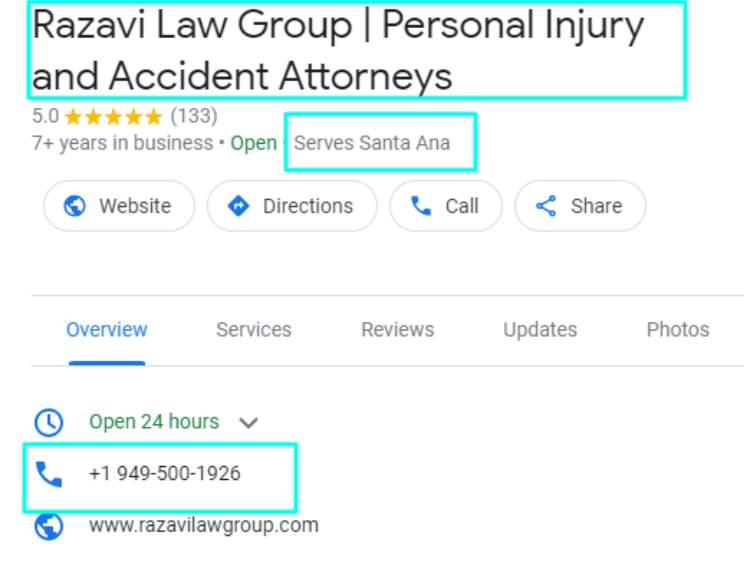
Maintaining NAP (Name, Address, Phone Number) consistency is crucial for local SEO success, especially for law firms aiming to enhance their online visibility and attract local clients. Here’s a guide on how to ensure NAP consistency:
- Ensuring Accurate and Consistent Business Information
Consistency is key when it comes to NAP information. Ensure that your law firm’s name, address, and phone number are consistent across all online platforms, including your website, social media profiles, and legal directories.
- Updating Information Across Online Directories
Regularly update your business information on online directories to reflect any changes. This may include updates to your address, phone number, or business hours. Inconsistencies in NAP information can negatively impact your local search ranking.
- Importance of NAP Consistency for Local Search Ranking
Search engines rely on consistent NAP information to verify the legitimacy and relevance of a business to a local search query. Inconsistent information can lead to confusion and may result in lower visibility in local search results.
Local Link Building Strategies
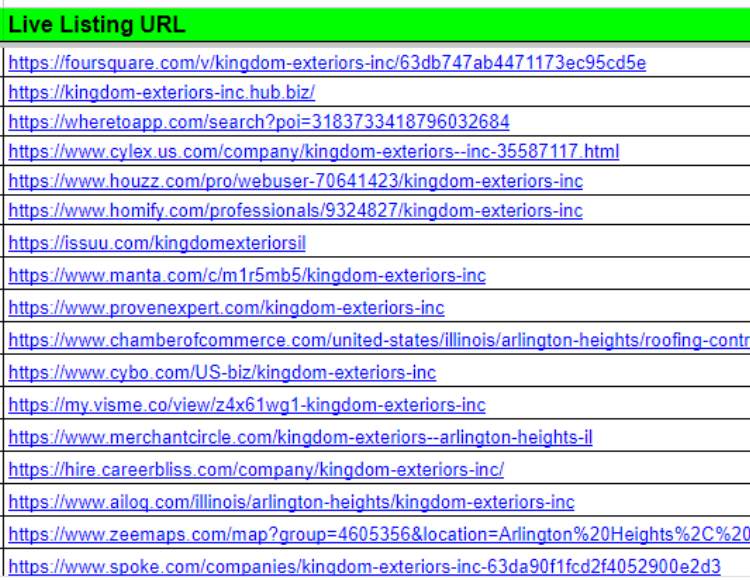
Local link building is a vital component of local SEO for law firms. Building high-quality local links helps increase your online visibility, authority, and relevance in your geographic area. Here are 4 local link building strategies for law firms
1.Building High-Quality Local Citations
Local citations, which include your law firm’s information on various online platforms, contribute to your local search ranking. Ensure that these citations are accurate and consistent. Use reputable local business directories and legal directories to build high-quality citations.
2. Obtaining Local Backlinks from Authoritative Sources
Backlinks from local authoritative sources, such as legal organizations, local news websites, or community organizations, can significantly impact your local SEO. Build relationships with these entities and seek opportunities for local backlinks.
3. Participating in Local Community Events and Sponsorships
Active participation in local events and sponsorships not only benefits the community but also provides opportunities for exposure. Consider sponsoring local sports teams, community events, or legal education programs to enhance your law firm’s visibility.
4. Leveraging Local Partnerships for Link Building
Collaborate with other local businesses, legal or non-legal, to build partnerships that include link-sharing opportunities. This not only expands your online network but also contributes to a stronger local SEO presence.
Content Marketing For Law firms

Content marketing is an essential strategy for law firms seeking to establish a strong online presence and connect with their target audience. By creating and distributing valuable, relevant content, law firms can showcase their expertise, build trust, and attract potential clients. This involves understanding the needs of the audience, setting clear objectives, and diversifying content formats to cater to different preferences. Whether through blog posts, case studies, or social media engagement, content marketing allows law firms to demonstrate thought leadership, address legal FAQs, and provide educational resources.
Monitoring analytics and staying compliant with legal and ethical guidelines are critical components, ensuring that the content strategy remains effective and aligned with professional standards. Regular adaptation to industry trends and evolving client needs is key to maintaining a successful content marketing approach in the dynamic legal landscape.
Setting Up Google Analytics for Monitoring Local SEO Performance
Google Analytics provides valuable insights into your website’s performance. Set up Google Analytics to track key metrics, such as website traffic, user engagement, and conversion rates. Use this data to make informed decisions and adjustments to your local SEO strategy.
Google My Business provides insights into how users interact with your GMB profile. Monitor metrics such as the number of views, clicks, and actions taken on your profile. Use this information to assess the effectiveness of your GMB optimization efforts.
Regularly review performance data from Google Analytics and GMB Insights. Identify trends, strengths, and areas for improvement. Adjust your local SEO strategies accordingly, whether it involves refining keyword targeting, improving website content, or enhancing your online presence.
Final Tips for Maintaining a Strong Local Online Presence
Stay Engaged Locally: Actively participate in local events, sponsorships, and community initiatives to strengthen your local ties.
Monitor Competitor Activity: Keep an eye on what other law firms in your area are doing online. Identify successful strategies and areas for differentiation.
Seek Professional Guidance: If navigating the complexities of local SEO feels overwhelming, consider seeking assistance from digital marketing professionals with experience in the legal industry.
By implementing these strategies and staying proactive in your approach, your law firm can establish and maintain a robust local online presence, ultimately attracting more clients and solidifying your position in the competitive legal landscape.









